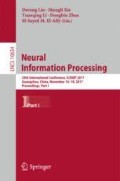Abstract
Maximization of average reward is a major goal in reinforcement learning. Existing model-free, value-based algorithms such as R-Learning use average adjusted values. We propose a different framework, the Average Reward Independent Gamma Ensemble (AR-IGE). It is based on an ensemble of discounting Q-learning modules with a different discount factor for each module. Existing algorithms only learn the optimal policy and its average reward. In contrast, the AR-IGE learns different policies and their resulting average rewards. We prove the optimality of the AR-IGE in episodic and deterministic problems where rewards are given at several goal states. Furthermore, we show that the AR-IGE outperforms existing algorithms in such problems, especially in situations where policies have to be changed due to changes in the task. The AR-IGE represents a new way to optimize average reward that could lead to further improvements in the field.
Access this chapter
Tax calculation will be finalised at checkout
Purchases are for personal use only
References
Das, T.K., Gosavi, A., Mahadevan, S., Marchalleck, N.: Solving Semi-Markov decision problems using average reward reinforcement learning. Manage. Sci. 45(4), 560–574 (1999)
Deisenroth, M.P., Neumann, G., Peters, J.: A survey on policy search for robotics. Found. Trends Robot. 2(1–2), 1–142 (2011)
Gosavi, A.: Reinforcement learning for long-run average cost. Eur. J. Oper. Res. 155(3), 654–674 (2004)
Kurth-Nelson, Z., Redish, A.D.: Temporal-difference reinforcement learning with distributed representations. PLoS One 4(10), e7362 (2009)
Mahadevan, S., Marchalleck, N., Das, T.K., Gosavi, A.: Self-improving factory simulation using continuous-time average-reward reinforcement learning. In: Proceedings of the 14th International Conference on Machine Learning, pp. 202–210 (1997)
Puterman, M.L.: Markov Decision Processes: Discrete Stochastic Dynamic Programming, 1st edn. Wiley, New York (1994)
Reinke, C., Uchibe, E., Doya, K.: Maximizing the average reward in episodic reinforcement learning tasks. In: 2015 International Conference on Intelligent Informatics and Biomedical Sciences (ICIIBMS), pp. 420–421. IEEE (2015)
Schwartz, A.: A reinforcement learning method for maximizing undiscounted rewards. In: Proceedings of the Tenth International Conference on Machine Learning, vol. 298, pp. 298–305 (1993)
Sutton, R.S., Barto, A.G.: Reinforcement Learning: An Introduction. Cambridge University Press, Cambridge (1998)
Tanaka, S.C., Schweighofer, N., Asahi, S., Shishida, K., Okamoto, Y., Yamawaki, S., Doya, K.: Serotonin differentially regulates short-and long-term prediction of rewards in the ventral and dorsal striatum. PLoS One 2(12), e1333 (2007)
Tsitsiklis, J.N.: Asynchronous stochastic approximation and Q-learning. Mach. Learn. 16(3), 185–202 (1994)
Watkins, C.J.C.H., Dayan, P.: Q-learning. Mach. Learn. 8(3–4), 279–292 (1992)
Watkins, C.J.C.H.: Learning from delayed rewards. Ph.D. thesis, University of Cambridge, England (1989)
Yang, S., Gao, Y., An, B., Wang, H., Chen, X.: Efficient average reward reinforcement learning using constant shifting values. In: Thirtieth AAAI Conference on Artificial Intelligence (2016)
Acknowledgement
We thank Tadashi Kozuno for his help with parts of the optimality proof.
Author information
Authors and Affiliations
Corresponding author
Editor information
Editors and Affiliations
Rights and permissions
Copyright information
© 2017 Springer International Publishing AG
About this paper
Cite this paper
Reinke, C., Uchibe, E., Doya, K. (2017). Average Reward Optimization with Multiple Discounting Reinforcement Learners. In: Liu, D., Xie, S., Li, Y., Zhao, D., El-Alfy, ES. (eds) Neural Information Processing. ICONIP 2017. Lecture Notes in Computer Science(), vol 10634. Springer, Cham. https://doi.org/10.1007/978-3-319-70087-8_81
Download citation
DOI: https://doi.org/10.1007/978-3-319-70087-8_81
Published:
Publisher Name: Springer, Cham
Print ISBN: 978-3-319-70086-1
Online ISBN: 978-3-319-70087-8
eBook Packages: Computer ScienceComputer Science (R0)

